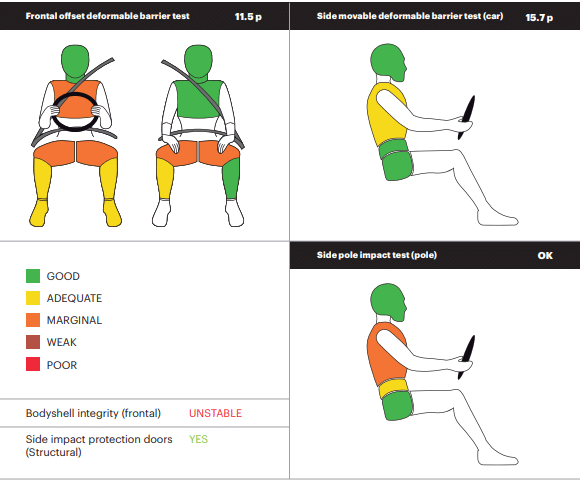The new Hyundai Verna has scored a 5-star safety rating in Global NCAP and becomes the first Hyundai sold in India with a 5-star rating. The model tested was made in India for sale in India and came equipped with 6 airbags, ESC, rear ISOFIX mounts and seat belt reminders for all seats as standard.
Notably, this is one of the last few cars to be tested under the Safer Cars For India programme as, from October 1, Bharat NCAP is responsible for testing cars sold in the Indian market.
- Verna scores 5 stars for adult, child occupant protection
- Bodyshell integrity was rated as unstable
- Model tested had 6 airbags, ESC as standard
Hyundai Verna adult occupant crash test rating
The Verna scored 28.18 points out of 34 in adult occupant protection, although the bodyshell was rated unstable and not capable of withstanding further loadings. The Verna offered good protection to the driver’s and passenger’s head and neck in the frontal impact test, but chest protection for the driver was marginal. Passenger chest protection, however, was rated good.
Furthermore, the driver’s and passenger’s knees showed marginal protection as they could be impacted by dangerous structures behind the dashboard. The footwell area was also rated as unstable.
In the side impact test, the Verna offered good protection to the front passenger's head, pelvis and abdomen, but chest protection was adequate. Meanwhile, in the side pole impact test, the Verna was rated an ‘OK’ with good protection to the passenger's head and pelvis, marginal protection to the chest and adequate protection to the abdomen.

The Verna was also tested for ESC performance, with the result being acceptable as per Global NCAP’s requirements. It also complied with UN 127 and GTR9 pedestrian protection norms.
Hyundai Verna child occupant crash test rating
The Verna scored 42 points out of 49 in child occupant protection. This includes the 12 out of 12 points for the CRS (Child Restraint System) installation, and 24 out of 24 points in the dynamic score.
GNCAP tested the Verna with dummies of an 18-month-old and a 3-year-old child, with both seats facing rearward. They were placed in the car using i-size anchorages and a support leg, and both helped prevent head exposure in a frontal crash. The CRS also offered full side impact protection.
The Verna gets 3-point seat belts as standard on all seats, but the front passenger airbag cannot be disengaged in case a rearward-facing CRS is installed.
Interestingly, a CRS failure was noted after the side impact test, but the manufacturer identified this as a one-off. In order to verify the claim, Global NCAP performed a subsequent higher energy side impact test and the CRS showed no further sign of failure.
Hyundai Verna rating compared with rivals
In the midsize sedan segment, apart from the Verna, the Slavia and Virtus have also been crash tested by Global NCAP. While all three cars boast of 5-star rating, the latter two fared marginally better in adult occupant protection and also had a stable body shell. You can read more about it here.
Also See:
Volkswagen confirms three-row Tayron SUV for global markets








.jpg?w=234&h=156&q=90&c=1)



Comments
Member Login
Personal Details
No comments yet. Be the first to comment.